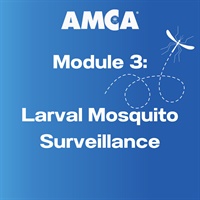Larval Mosquito Surveillance - Module 3
- Average Rating:
- Not yet rated
- Categories:
- Integrated Mosquito Management
- Faculty:
- Larry Reeves, Ph. D.
- Course Levels:
- All Levels
- Duration:
- 18 minutes
- Format:
- Audio and Video
- License:
- Never Expires.
Description
Welcome to Module 3 Larval Mosquito Surveillance of the AMCA Best Practices for Integrated Mosquito Management Virtual Training Program. This training program will provide you with the knowledge needed to understand and conduct Integrated Mosquito Management (IMM); including topics such as mosquito biology and the five main components of IMM: community engagement, collecting and using data, reducing potential larval habitat, using all control methods available and reasonable, and regularly evaluating the efficacy of the program.
Note, that this module is part of a larger program, and if you are interested in completing the AMCA Best Practices for Integrated Mosquito Management Virtual Training Program Certificate, you MUST do this module within the overall program. Please subscribe to the program prior to beginning this module, please click here to begin.
Specifically, this module will cover:
- Biology and morphology of immature mosquitoes
- Mosquito larval habitats and life histories
- Tools used for immature surveillance
- Types of data to collect
- Storing and using immature surveillance data
Recommended reading for this module:
- Pages 33-38 in "Best Practices for Integrated Mosquito Management" found at https://www.mosquito.org/assets/pdf/hr_november_2021_amca_bmp_ma/
Additional Resources
- O’Malley, C. 1995. Seven ways to a successful dipping career. Wing Beats, 6, 23-24.
- Darsie, R.F. and Ward, R.A. 2005. Identification and geographical distribution of the mosquitoes of North America, north of Mexico (Vol. 10, pp. 0090-3558). Gainesville, FL: University Press of Florida. https://upf.com/book.asp?id=9780813062334
- Silver, J.B. 2007. Mosquito ecology: Field sampling methods. Third Edition. Springer Science & Business Media. https://link.springer.com/book/10.1007/978-1-4020-6666-5
Handouts
Additional Resources
|
|||
Faculty
Larry Reeves, Ph. D. Related Seminars and Products
Dr. Lawrence Reeves is an assistant professor with the University of Florida, based at the Florida Medical Entomology Laboratory. He is interested in mosquito diversity, ecology, and biology, and the ecology of mosquito control. He initially became interested in mosquitoes because they interact with a tremendous range of organisms from Nepenthes pitcher plants, to marine mammals, to Burmese pythons, to the pathogens they transmit. He first realized the importance and central ecological position of mosquitoes when he was infected with dengue virus while studying Lepidoptera in the Philippines. Dr. Reeves' research integrates lab and field work through DNA barcoding, using molecular techniques to understand species diversity and boundaries, to reveal interactions between mosquitoes and other species, and to better understand the evolution of mosquito host associations.
